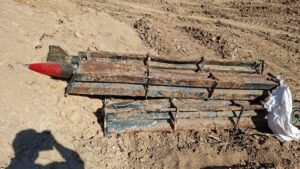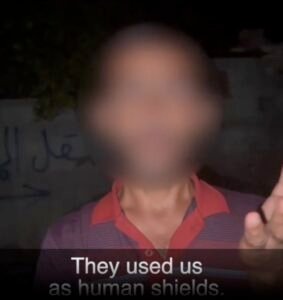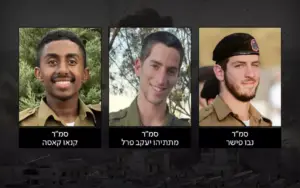Hostages:
Hamas’s newest demand: a seven day ceasefire, so that they can check which hostages are still alive, and where they are.
Gaza:
Thank G-d, the IDF didn’t announce any fallen heroes today.
In the afternoon, Hamas launched a rocket from Southern Gaza, at Israeli border towns.
As is Hamas’s custom, at exactly midnight of New Years’, Hamas fired rockets at Israel: two towards the city of Netivot and its surroundings, which is just outside the Gaza border community area. This is in stark contrast to last year, when Hamas fired 27 rockets at Central Israel—something they are no longer capable of doing.
Following the launch, the IDF issued evacuation warnings for the al-Bureij area in Central Gaza, from where the rockets were launched, warning of an incoming attack.
The Shin Bet and IDF announced that they eliminated Abd al-Hadi Sabah, the Hamas Nukhba commander who led the horrific massacre and kidnapping in Kibbutz Nir Oz on October 7th. Since then, Sabah led many attacks against IDF troops in Gaza. He was eliminated with a drone strike to his hiding spot in the designated humanitarian zone part of Khan Younis, Southern Gaza. As always, the IDF took precautions to avoid harming civilians in the strike.
The Shin Bet confirmed that earlier this month, Anas Muhammad Saadi Masri, a senior commander in the Palestinian Islamic Jihad (PIJ) was eliminated in a drone strike. Masri commanded the PIJ’s rocket division in Northern Gaza, and on October 7th, commanded the heavy rocket fire on Israel’s border towns.
Operations on ground are ongoing in Beit Hanoun, and Beit Lahiya, in Northernmost Gaza.
In a post on X (Twitter), UNRWA wrote a commemoration for 258 “team members” killed in Gaza in 2024. The team members being commemorated by the UN organization are almost all card-carrying Hamas terrorists, and UNRWA was made well aware of the fact.
Yemen:
The Houthis attempted to launch two ballistic missiles at Tel Aviv, but they fell short, and didn’t reach anywhere near Israel.
American military forces (CENTCOM) carried out several attacks against Houthi targets in Yemen on December 30th and 31st, both in the capital Sana’a and along the coast. The targets included:
– A Houthi control center
– Facilities where missiles and armed drones were made and stored
– A radar station on the coast
– Seven cruise missiles and armed drones that were positioned to attack ships
The strikes were conducted by U.S. Navy ships and aircraft, along with Air Force planes. These Houthi facilities had been used to launch attacks against both American warships and civilian cargo vessels traveling through the Red Sea and Gulf of Aden.
Syria:
The new Syrian leader, Al-Julani, is continuing to show efforts to create cohesion in Syria. Today, for the first time, he met with senior representatives of the Kurdish autonomy (the democratic forces in Syria, aka SDF, which are backed by the U.S.). Al-Julani described the meeting as positive. In another surprising move, he sent a congratulatory message to Christians in Syria, wishing them a Happy New Years, and praising them for being an essential part of Syrian society.
Al-Julani, whose rebel group is an Al Qaeda break-off with a name that outlines similar aspirations to ISIS, is working hard to gain western recognition and acceptance. Some in Israel are expressing cautious optimism, while others warn about falling for the snake’s trap. In a Saudi interview, al-Julani explained that his interim government is laying the grounds to enable elections in four years’ time. We may not see the true al-Julani until then. There also still remains the possibility of further rebel break-off groups who are unhappy with al-Julani’s western appeasement, and move towards terrorism. Many of his own soldiers have already been tormenting non Muslims, against his directives.
Lebanon:
IDF troops located a large cache of Hezbollah weapons in the Wadi Saluki area of southern Lebanon. The cache contained rocket launchers, missiles, explosives, and other weapons. More weapons were found hidden in nearby buildings, including assault rifles, grenades, missiles, mines, explosive devices, and other military equipment. The troops confiscated the equipment, and then destroyed the buildings.
Several international delegations have arrived in Lebanon (or are on their way), to discuss the implementations of the ceasefire agreement with Israel. Among them are a French minatorial delegation a Saudi delegation led by the Foreign Minister, and U.S. envoy Amos Hochstein. They are expected to meet with the Speaker of the Lebanese Parliament.
Hezbollah has not been following the ceasefire agreement, leading Israel to attack their positions dozens of times since the start five weeks ago. Deputy Head of Hezbollah’s Political Council, Mahmoud Kamati, threatened that if the IDF does not withdraw from Lebanon after the 60 day agreement, they will “deal with them accordingly.” Simultaneously, he threatened Lebanese authorities and refused to disarm, claiming that “talking about disarmament will push the country into chaos.”
Ini other words, Hezbollah is demanding that Israel withdraw, but other than not firing for 60 days, Hezbollah is refusing to keep any other part of the agreement. They are not disarming, and they are not moving north of the Litani River.
Shin Bet Annual Report:
As every year, the Shin Bet (aka, Shabak, Israel’s internal secret service) released a report summarizing activity in 2024. Below, in bullet points, are some of the highlights, by sector. Reading through it, you’ll notice that for every terror attack in Israel, there are hundreds which have been prevented, thank G-d.
Judea, Samaria, and Jerusalem
- Terror Prevention:
- Foiled 1,040 significant terror attacks, which included:
- 689 planned shootings
- 326 involving explosive devices
- 13 stabbings
- 9 car-rammings
- 2 suicide bombings
- 1 kidnapping
- Saw a 40% drop in terror attacks compared to 2023.
- Foiled 1,040 significant terror attacks, which included:
- Special Operations:
- Conducted dozens of joint operations with IDF and police.
- 10 missions focused on detaining terror suspects or eliminating threats.
- Raided hospitals in Jenin and Shechem (Nablus) targeting terror operatives.
Gaza Strip
- Detentions and Interrogations:
- Assisted in the detention of 1,350 Gazan terror suspects at checkpoints:
- 40 senior commanders
- 165 suspects close to top officials
- 45 involved in the October 7 onslaught
- 100 with information about hostages
- Handled 2,500 suspects, with over 650 interrogated.
- Interrogations yielded:
- Life-saving intelligence for ground operations.
- Targeting information for hundreds of terror sites.
- Hostage and Special Operations:
- Conducted 3 hostage rescue missions.
- Recovered bodies of captives.
- Assisted in the detention of 1,350 Gazan terror suspects at checkpoints:
Lebanon
- Counter-Terrorism:
- Involved in eliminating 25 senior commanders in Palestinian terror groups:
- Hamas
- Al-Jama’a al-Islamiyya
- Popular Front for the Liberation of Palestine
- Involved in eliminating 25 senior commanders in Palestinian terror groups:
Inside Israel
- Terror Cells:
- Discovered 20 terror cells among Arab Israelis.
- 5 of those cells planned attacks involving explosives or car bombs.
- Counter-terror Forces:
- Dispatched “Tequila” elite teams 32 times to prevent imminent attacks.
Iranian Espionage
- Detainees and Indictments:
- 400% increase in espionage-related detentions compared to 2023.
- Foiled 13 espionage incidents involving Israelis working for Iran.
- Filed 27 indictments.
- International Operations:
- Conducted dozens of security operations abroad.
- Secured Israeli delegations to the Paris Olympics and Eurovision in Malmo.
Cybersecurity
- Cyber Threats:
- Saw a 5x increase in cyberattacks during the war.
- Assisted in foiling 700 cyberattacks alongside IDF and National Cyber Directorate.
Abroad
- Dozens of security operations were conducted abroad, including special missions for the Israeli delegations to the Eurovision Song Contest in Malmo, Sweden, and then the Olympics in Paris, France.




